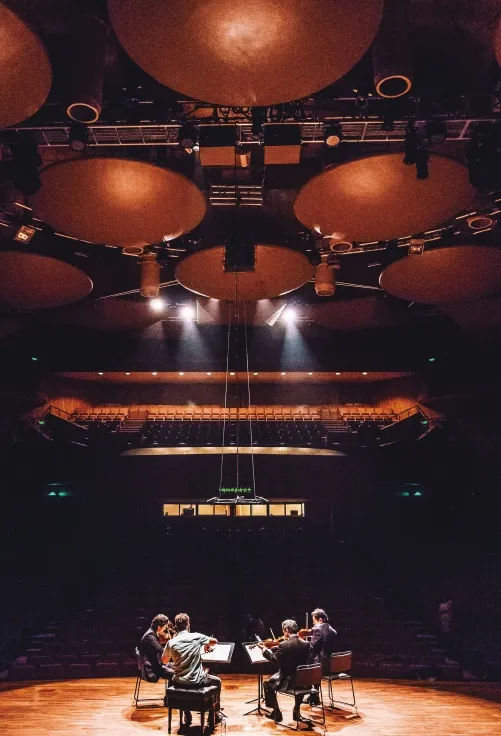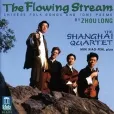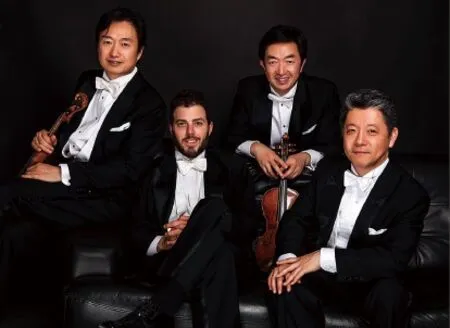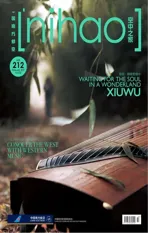THE SHANGHAI QUARTET: CONQUER THE WEST WITH WESTERN MUSIC
2017-04-27BrookeYan,BianJiajin,Yishan等
THE SHANGHAI QUARTET: CONQUER THE WEST WITH WESTERN MUSIC
Among the most active quartet groups in the world, The Shanghai Quartet is no doubt one of the best. They are like diplomats who travel between China and the west, but they do it with music. Western audiences are often amazed by this group of Chinese who has so profound understanding of the Western music, while audiences from their home country learn from them that what it takes to enter the world stage, the extreme preciseness and confidence from the depth of the heart.
Text by Brooke Yan Translation by Bian Jiajin& Yishan Photos by Zeng Jian & Xu Tao

上海四重奏:用西方音乐征服西方
当今活跃在世界舞台的四重奏里,上海四重奏,无疑属于最顶级的组合之一。
他们就像一群游走在东西方之间的音乐外交家。西方观众惊叹于东方人可以对自己文化理解如此深刻,东方观众惊叹于世界舞台的博大而能真正走入其中央的人,原来需要这样精准的步伐与深沉的的自信。


At 8 p.m., Nov 18th, in the middle of the stage at Xinghai Concert Hall, there were nothing more than four music stands, four chairs, and one spotlight.
Among them four gentlemen in tuxedos who stepped towards the chair. They opened the score and signalled with eye contact, the Mendelssohn: String Quartet No. 6 in F minor started.
The almost empty stage, at all a sudden, was filled with the vigourous melody and precise and elegant performance. Everyone's eyes and ears were attracted by the four people on the stage at a very time. The process took place neat and without redundant move.
The performance was The Shanghai Quartet Chamber Concert that have been put up on stages over 100 times all over the world. The four players have already got used to the process of marvelling audiences who have no idea what will happen with a fabulous, neat, and elegant start. In China where chamber music is still enjoyed by a niche of people, few audiences know that this quartet group with distinct Chinese mark has already been one of the best in the world.
“Once we played Haydn on a cruise ship. An Austrian old lady asked me seriously after she saw our show: 'How could you understand our music so thoroughly?' And another foreign artist said, what you are playing is what I can not draw.” The second violinist Jiang Yiwen says with a smile.
As an easterner, it's not easy to touch the western audience by performing the western music. “We don't have such kind of historical background, or such cultural popularization among the whole people as Meiji Restoration in Japan. When people hear our name, it's not Jewish or Japanese, they don't expect too much from us. In other words, if you just do as well as others, they still don't take a glance. But when you do much better than others, they have to pay attention and show some respect.” Says one of the founders and the first violinist of Shanghai Quartet, Li Weigang. “It's pretty much the same as language speaking. If you can just poorly say hello, it sounds absolutely not authentic enough. When you hear a westerner speaking better Chinese even than yourself, you think it's so impressive.”
“If not exposed to western culture, not able to master the language of music, we actually wouldn't have the right taste for the work, or say, we cannot feel the 'smell' of that person. Playing the violin is basically like communicating with an instrument. But when you can use only one sound, one gentle sound, or use only one level of strength, it's not possible to interpret different works. It's so-called the not-pure.”Says Jiang.During the rehearsal, the members were almost speaking English all the way. But someone who uttered some Chinese was the only American - cello Nicholas Tzavaras.“He is now learning Chinese, for he comes to perform in China very often, and he wants to know more about how the audience think.”says the viola, Li Honggang.
Now they have already experienced how to interpret western culture, and have wider and freer application of quartet. In 2003, Jiang Yiwen recomposed 24 Chinese folk songs and released the album Chinese Folk Songs, and this is till now their best-seller. “At first I tried to recompose for fun just because I missed my hometown so much. I didn't have an intention to spread Chinese culture among the Westerners. But if your work is good, you don't need to force anything and it will be appreciated. Just like the top Chinese art pieces in the auction house, people bid for them no matter how expensive they are.”Says Jiang.
Li Weigang explains,“ I think working on something is not for entering others' world. When you have an impure ambition, you cannot reach what you want. I believe everyone loves good music. We hope strongly that chamber music and quartet can gradually reach a high climax in China. Each has three or four groups, competing with each other. Because it's beautiful. As long as they are well performed, there are great shows and professional organizers, the audience will be cultivated."

2016年11月18日晚8:00,星海音乐厅的舞台中央,四个谱架,四张椅子,聚光灯打在正上方,没有任何多余。
三位东方面孔、一位西方面孔的绅士,身穿燕尾服走到台前,翻开谱子、拉开乐器,简单的眼神示意后,一起分毫不差地拉下《门德尔松:F小调四重奏作品80号》的第一个音。一瞬间,原本略显简单的舞台,立刻光芒四射,充盈着激荡饱满的旋律与精准优雅的演奏。所有人的听觉、视觉都紧紧地被舞台上这四个人吸引。这整个变化过程,不需要任何多余。
每年在全世界演出近100场的上海四重奏,已经非常习惯中国观众的这种变化——从无预期瞬间变为惊艳。在室内音乐还没有被太广泛了解的中国,很少有人知道,眼前这几张中国面孔以及名字中有明显中国标记的四重奏组合,其实已经是世界公认的顶级水平。
“我想这需要一个过程,等他们听过世界上各种优秀的四重奏组合后,就会对我们有一个更公正的评价。”第二提琴手蒋逸文微笑着说,他对此有足够的自信。“有一次我们在一个邮轮上演奏海顿的作品,一个奥地利老太太听完很严肃地问我:‘为什么你们可以对我们的音乐理解得这么透彻,而我们却对你们的文化完全不了解?还有一个外国画家说,你们演奏出来的颜色是我画不出来的。”
要用西方的音乐打动西方观众,这个过程相当不容易。“中国没有相关的历史背景,也没有类似日本明治维新的全民普及西方文化的过程。一开始,在国外演出时,人们听到我们的团名,不是犹太人,也不是日本人,都不会抱着太高的期待。可以说,你如果跟别人演奏得一样好,别人都不会朝你看一眼。你要比别人好很多,别人不得不看你,才能让别人心服口服。”上海四重奏的创始人之一、第一小提琴李伟纲说,“就像说话一样,如果只会洋腔洋调地打个招呼“你们好不好”,一听就不像懂的。只有当一个西方人讲中文讲得比我还好,你就觉得好牛。而我认为,我们的优势是最尊重作曲家原意,把伟大作品用我们觉得最恰当的方式,把它重新还原成活的东西。”
“如果没有浸泡在对方的文化里,没掌握到对方音乐的语言,其实就是没有味儿(作品的味道),或者说有人味儿(造作感)。拉琴实际是用工具在说话,你要是只会拉一种声音,只会用一种柔音,只会用一种力度,那就不能表达不同的文化背景作品,就是所谓的不地道的味道。”蒋逸文说。
在彩排现场,成员们基本全程用英文沟通,反而是唯一的美国大提琴手尼古拉斯·萨瓦拉斯偶然会冒出两句中文。“他现在在学习中文,因为常常要来中国演出,他想了解观众们在想什么。”中提琴李宏刚说。
如今的上海四重奏早已过了只关注地道西方味的阶段,而有了更宽广的创作自由。2003年,蒋逸文改编了24首中国名曲发行了《中国歌谣》,这也是他们迄今最畅销的一张专辑 。“最初我是因为怀念家乡就试着改编着玩,并不带着向西方人去传播什么的目的。强迫人家去听,像喂饭一样肯定是不行的。好的东西你不用强制,别人都会来拿走。就像拍卖行里那些顶级的中国艺术品,再高的价也会有人买回去。”蒋逸文说。
“我觉得去做一个东西,不是为了进入别人的世界。你的目的不纯,就做不到的。其实人都是喜欢好的音乐。我们特别希望在中国慢慢掀起演奏室内乐、四重奏的高潮,每个乐团都有三四个,大家争先恐后的。因为它很好听,只要拉得好,有高水平的演出,专业的组织者,就可以培养出观众。”李伟纲说。
30多年前,这几位少年怀揣着对西方音乐殿堂的向往,从中国远赴欧美踏上学习之路;30多年后,成为世界一流的他们,把理解到的西方音乐和西方文化精华,演绎“翻译”给正在慢慢成长的中国观众——这样一段人生历程,一如它发生的时代充满精彩。
“AS LONG AS YOU CONTRIBUTE TO THE WORLD, YOU WILL BE APPROVED BY EVERYONE”
NIHAO: Are there any troubles for Chinese people when learning Western classical music? Li:My thought is always that Western classical music is in nature not Chinese music, it's others. Therefore, it sets no limitations for me at all. I simply learn from anything great from them, regardless from Germany, Austria, or France, and that may result in a better accomplishment. While we were performing in Germany, some of the audience said that we should become German citizens, because what we played were totally authentic. And when we were performing in Hungary, the audience said we should become Hungarian honorary citizens. Hearing this, we feel very happy. The language may not be able to integrate, but at least the musical integration has been somehow realized.
NIHAO: Performing Chinese music in the western way, is it a good read of popularizing Chinese culture? Jiang:Actually I didn't think so much. Good music or good language which are easy to be understood will definitely be comprehended and then liked by others. I never thought of exploiting music to break out western culture, or to express something from China. When we self appreciate it, the audience will also like it. The songs that I decided to recompose were all widely known in 1970s, but many people would feel the beauty in the music is different, for there was no ensemble to interpret it or possibility to play it in different voice parts at that time like there is today. I am not purposely showing off that it is a Chinese song and must be played by Chinese to emphasise its roots. When the music wants to be globally recognised, it should have the nature to be played by anyone from any culture. He or she knows everything when having a first look at the music score, and there is no need to imitate anything. The features of Chinese folk music lie in the pentatonic scale, the glide and the like. Thus, these featured techniques are better just marked on the music score, but should not to be overacted to please the public. I just don't think that could realise the so-called Chinese tradition.
Li:The violin is in fact a very expressive instrument, especially in the quartet, for it includes four instruments. The advantage of Jiang is that he has been immersed in it for so many years. The rhythm, the accompany, and the detailed alternatives in the music have already become an instinct for him. He can freely express something by playing in a quartet, without the limits of styles and instruments. Furthermore, he's originally Chinese, and we all love this kind of music since we were young. Sometimes, nostalgic has it's own merits. As a girl puts on many vintage items, the colours and how they match are controlled by her, so the overall feel is still elegant. It has always a margin of aesthetics. When you cross the end, it becomes kitsch. At last, what we are pursuing is beauty.
NIHAO: What's changed most by the western world to you? Jiang:I believe it's the logics and the way of thinking. The criterion of excellence in western culture is your contribution to the world, rather than becoming the top class. There is no point of forcing others to recognise your work. As long as you think it's good, not only to your nation, but also to the whole world, everyone will finally approve you. And you don't even need to care about this approval. As long as that's really what you want to do, others' opinion has nothing to do.
Li:I think it's the attitude toward the world. After going abroad, I realised that there are different kinds of points of view. The conflicts between many cultures result from religion. People stick to their own viewpoints and regard others as wrong. Why not live together? Why are we always competing against each other?
“只要对世界有贡献,谁都会来承认你”
NIHAO:中国人学习西方古典乐会不会有障碍?李:我的理念一直是西方古典乐本身就不是中国音乐,是别人的东西,这反而让我没有界限。只要好的我都学,不管是德国、奥地利、还是法国的,所以很有可能最终达到的高度更高。就像我们在德国演出,有听众说你们应该成为德国国民,因为听到你们演出来的德国作品味道是最正宗的;到了匈牙利演出,又有听众说你们应该是匈牙利的荣誉国民(笑)。听到这些挺开心的,语言未必可以达到完全的融入,但音乐是可以实现的。

NIHAO:用四重奏演绎中国音乐,会是传播中国文化的好方式吗?
蒋:其实我没想那么复杂。好的音乐大家都容易懂,会自己领会,自己决定是否喜欢。我没有想过利用它去突破西方的什么,表达中国的什么。我自己觉得好听的,就觉得观众也会觉得好听。我改编的一些中国70年代家喻户晓的曲子,但很多人会感觉听起来的美感非常不同,因为过去没有用重奏的方式来解读,加入不同声部。我并不愿意刻意去突出,一定要中国人才能把它拉出中国味道。你既然要被国际上认可的话,应该是各种族的人都可以拉。他看了这个谱子就应该知道,而不用刻意去模仿什么。中国民乐比较独特的地方比如说五声音阶、滑音,这种特别的技巧在谱子里标记出来就好,而不需要哗众取宠式地弄得全是这种滑来滑去的音,这不是我认为的中国味道。
李:小提琴其实是一种相当有表现力的乐器,四重奏表现力更强,因为它有四种乐器。蒋老师的优势是多年浸泡在里面,不光是旋律,不光是伴奏,中间有很丰富的枝节变化,已经成为一种本能,可以很自由地用四重奏的形式去表达,不受原来的曲风、乐器的限制。而且,他骨子里还是一个中国人,我们也都喜欢这些从小就听到的音乐。有时候,土的东西很有味道,你看有的女孩全用土布的东西,还是很漂亮,它的颜色、它的搭配有自己的语序,整体还是很雅的。它有一个基本审美的边缘,过了那条线就是俗。
NIHAO:西方对你们改变最大的是什么?
李:我觉得是看世界的角度。出国后我发现,原来从这个角度可以看,从那个角度也可以看。很多文化之间的矛盾,都是你有你的宗教,我有我的宗教,但互相之间在固执自己的是对的 ,别人的是错的。为什么不共处呢?为什么一定有高下?
蒋:我想是思维上的。西方衡量优秀的标准不是成为最顶级的,而是看你对世界的贡献是什么。不用强迫别人去承认你的东西,只要这个东西是好的,是你发自内心想做的,而且不光对你的民族,对世界都是有贡献的时候,谁都会来承认你。
The Shanghai Quartet and there Biography
上海四重奏和它的纪录











Established:The Shanghai Quartet is formed at the Shanghai Conservatory in 1983.
成立:上海四重奏1983年成立于上海音乐学院。
Regularly tours:They regularly tours the major music centers of Europe, North America and Asia. Recent festival performances range from the International Music Festivals of Seoul and Beijing to the Festival Pablo Casals in France, Beethoven Festival in Poland, Yerevan Festival in Armenia and Cartagena International Music Festival in Colombia, as well as numerous concerts in all regions of North America. The Quartet has appeared at Carnegie Hall in chamber performances and with orchestra; in 2006 they gave the premiere of Takuma Itoh's Concerto for Quartet and Orchestra at Carnegie Hall.
巡演:30多年来每季度前往欧洲、北美和亚洲的主要音乐中心举行巡演,参加过首尔国际音乐节、北京音乐节、法国卡萨尔斯音乐节、波兰贝多芬音乐节、亚美尼亚耶列万音乐节、哥伦比亚卡塔黑纳国际音乐节、澳大利亚墨尔本音乐节等。该团在卡内基音乐厅举办过多场室内乐演奏会、2006年在其大厅首演了伊藤琢磨为四重奏与乐队所作的协奏曲。
The most distinguished artists they worked with:they have performed with the Tokyo, Juilliard and Guarneri Quartets, cellists Yo-Yo Ma and Lynn Harrell, pianists Menahem Pressler, Yuja Wang, Peter Serkin and Jean-Yves Thibaudet, pipa virtuosa Wu Man and the male vocal ensemble Chanticleer.
合作过的顶尖音乐家:瓜内利四重奏、朱利亚四重奏、东京四重奏、马友友、林·哈雷尔 、梅纳海姆·普莱斯勒 、彼得·瑟金 、让-伊夫帝·博戴、吴蛮和香缇克利尔合唱团等。
Recordings:The Shanghai Quartet has an extensive discography of more than 34 ranging from the Schumann and Dvorak piano quintets with Rudolf Buchbinder to Zhou Long's Poems from Tang for string quartet and orchestra with the Singapore Symphony (BIS). Delos released the Quartet's most popular disc, Chinasong: a collection of Chinese folk songs arranged by Yi-Wen Jiang reflecting on his childhood memories of the Cultural Revolution in China. In 2009 Camerata released the Quartet's recordings of the complete Beethoven String Quartets, a seven-disc project.
唱片:总共发行34张唱片,包括与鲁道夫·布赫宾德合作的舒曼和德沃夏克钢琴五重奏、周龙为四重奏与管弦乐团谱写的《唐诗》、2003年发行的迄今最畅销的专辑《中国歌谣》、2010年七张全套贝多芬四重奏等。
Media projects:Including a cameo appearance playing Bartok's String Quartet No. 4 in Woody Allen's film Melinda and Melinda to PBS television's Great Performances series. Violinist Weigang Li appeared in the documentary From Mao to Mozart: Isaac Stern in China, and the family of cellist Nicholas Tzavaras was the subject of the film Music of the Heart, starring Meryl Streep.
媒体项目:在伍迪·艾仑的电影《双生美莲达》中客串演奏、参演美国PBS电视台的系列片《伟大的演出》。李伟纲曾出现在奥斯卡最佳纪录片《从毛泽东到莫扎特:斯特恩在中国》,由梅丽尔·斯特里普主演的电影《弦动我心》故事来自大提琴手尼古拉斯 ·萨瓦拉斯的家庭。
Serves Position:They serves as Quartet-in-Residence at the John J. Cali School of Music, Montclair State University, New Jersey, Ensemble-in-Residence with the Shanghai Symphony Orchestra, and visiting guest professors of the Shanghai Conservatory and the Central Conservatory in Beijing. They are proudly sponsored by Thomastik-Infeld Strings.
职务:目前是美国新泽西蒙特克莱尔州立大学的驻校四重奏、上海交响乐团的驻团四重奏。他们还出任上海音乐学院和中央音乐学院的室内乐客座教授职务。
